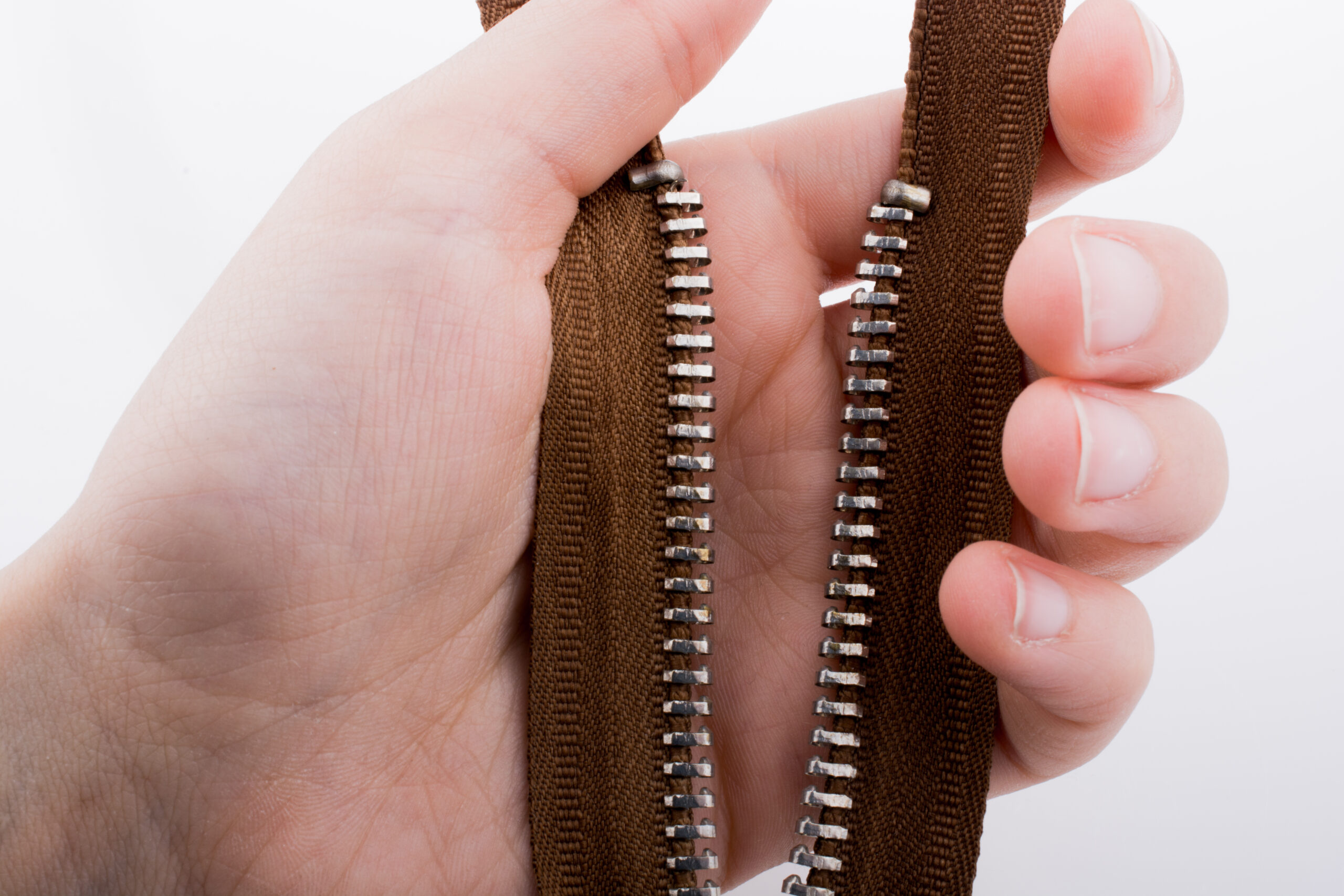Zippers may be one of the smallest components in apparel, outdoor gear, industrial covers, or uniforms—but they are often the first to fail. A broken or jammed zipper can result in warranty claims, product recalls, and customer dissatisfaction that far outweigh the cost of the hardware itself. For manufacturers and OEMs, zipper reliability is not optional—it’s a matter of brand reputation and product longevity.
This is why specialized partners like LenZip are critical. Since 1946, LenZip has engineered custom heavy-duty zippers designed for extreme durability and compliance, giving manufacturers confidence that their products will stand up to real-world conditions.
The Most Common Zipper Failures
Zippers fail in predictable ways, and most problems can be traced to design, material choice, or poor sourcing. Jamming often happens when dirt, lint, or stray fabric gets caught between the teeth, particularly in low-quality nylon coil zippers. Broken teeth are another common issue, usually caused by undersized gauges or weak plastic. Sliders may wear out, corrode, or lose tension, preventing the teeth from closing. In other cases, zippers split open because the slider no longer applies enough pressure to hold the chain together.
Environmental stress also plays a major role. Marine zippers corrode in saltwater, outdoor gear zippers degrade in sunlight, and tent closures can crack in freezing conditions. Each of these failures creates frustration for the end user and costly headaches for the manufacturer.

Root Causes of Failure
While zipper failure seems sudden, the root causes are usually clear. Using the wrong zipper type for the application—such as coil zippers in a heavy-duty bag—will guarantee premature breakdown. Undersized gauges are another frequent mistake, with #3 or #5 zippers placed in products that really need #8 or #10. Inadequate protective finishes also contribute to failure. Without flame-retardant, corrosion-resistant, or UV-protected coatings, zippers simply won’t last in demanding environments.
Perhaps the most overlooked cause is inconsistent quality control. Many overseas suppliers lack strict process standards, leading to weak alloys, brittle plastics, or substituted components that undermine durability across the entire batch.
Preventing Zipper Failure
The key to prevention is proactive engineering and sourcing. Matching zipper material to the environment is essential: nylon coil zippers work well for flexible designs, molded tooth zippers excel in marine or rugged outdoor use, and metal zippers deliver strength for industrial uniforms and automotive interiors. Gauge size should always be chosen according to stress load, with heavy-duty #8 or #10 zippers specified for demanding applications.
Protective finishes also make a dramatic difference. Flame-retardant zippers are standard in PPE, corrosion-resistant zippers are necessary for boat covers, and UV-stable options are critical for tents and outdoor fabrics. Manufacturers should also require suppliers to meet recognized benchmarks such as ASTM, NFPA, and MIL-SPEC standards. Finally, choosing a U.S.-based supplier like LenZip ensures better QC, faster lead times, and tailored engineering support.
Industry-Specific Challenges
Each industry faces unique zipper demands. Marine applications require corrosion-proof designs that resist salt, spray, and sun exposure. Tactical and military gear must meet MIL-SPEC abrasion and pull-strength requirements, with large-gauge zippers that resist sand and dust. Firefighter suits and hazmat gear depend on flame-retardant and chemical-resistant zippers that maintain safety under extreme duress. Outdoor gear, from tents to mountaineering jackets, needs closures that can withstand freezing temperatures and constant flexing. In upholstery, automotive, and industrial covers, the challenge lies in repeated use, exposure to cleaning chemicals, and high stress on seams.

The Role of Testing & Standards
Rigorous testing is the only way to confirm zipper reliability. Tensile strength tests measure how much pull a zipper can withstand, while abrasion and fatigue tests simulate years of open-close cycles. Salt spray testing validates corrosion resistance, and temperature cycling confirms whether zippers remain flexible in both hot and freezing conditions.
LenZip’s Zipper Testing Standards align with ASTM, NFPA, and MIL-SPEC protocols, ensuring products meet the performance requirements of industries where failure is not an option. Certified, tested zippers significantly reduce warranty claims and protect both brand reputation and customer safety.
Why LenZip Prevents Zipper Failures
Unlike mass-produced imports, LenZip designs each zipper system with durability in mind. From corrosion-resistant sliders for marine use to flame-retardant zippers for PPE and abrasion-resistant designs for tactical packs, LenZip offers solutions tailored to specific applications. With U.S.-based manufacturing, strict quality control, and custom engineering, LenZip ensures that OEMs receive zippers built to perform in the environments they face.
Conclusion & Call-to-Action
Zipper failure is not inevitable. Most breakdowns can be prevented through better material selection, proper gauge sizing, protective finishes, and rigorous testing. Partnering with LenZip, a U.S.-owned zipper manufacturer, gives OEMs access to reliable, compliant zippers engineered for durability in the toughest conditions.
Strong products begin with strong closures. Don’t let a weak zipper undermine your design. Explore LenZip’s products, review zipper types, and request a quote to specify closures that last.
FAQ – Why Zippers Fail
Q1. Why do zippers fail most often?
Most failures stem from poor material choice, undersized gauges, weak sliders, or missing finishes. Environmental stress like UV, salt, or cold accelerates breakdown.
Q2. What is the best zipper for heavy-duty applications?
Large-gauge molded tooth or metal zippers (#8 or #10) with protective finishes are the most reliable for industrial, marine, or tactical use.
Q3. How do you prevent zipper corrosion in marine or outdoor gear?
Choose stainless steel or brass with coatings, or heavy-duty molded tooth zippers designed specifically for saltwater and UV exposure.
Q4. Can zippers be tested for durability?
Yes. Testing to ASTM, NFPA, and MIL-SPEC standards ensures strength, abrasion resistance, and environmental performance.
Q5. Why should OEMs choose a U.S. zipper manufacturer like LenZip?
Domestic production means faster delivery, stricter quality control, and reduced supply chain risk compared to overseas imports.
